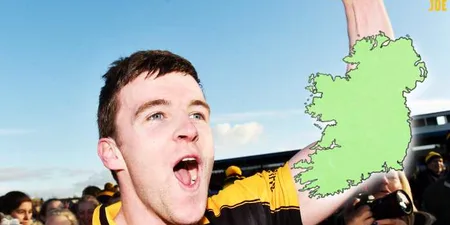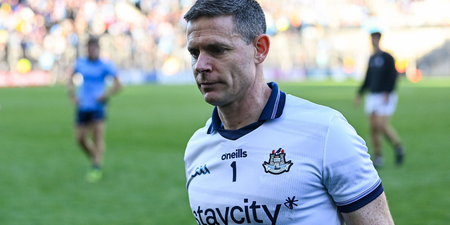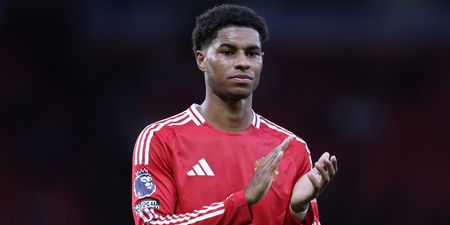Has anyone ever met a single soul that turned its nose up at an intermediate championship?
One of the things that defines the GAA is that it has a place for every man, woman and dog.
It has a place for some of the finest athletes on the planet and yet it still manages to reserve a special seat for even the most unsporting of us all. Anyone can find their role in this all-inclusive way of life and every single parish – however big, however small – is as important as the next.
The GAA never used to pretend that there wasn’t an imbalance. It never used to pretend that size didn’t matter. That clubs with maybe four kids coming through their local primary school classes could rule the island. Instead, they catered for that.
The idea of senior, intermediate and junior tiers didn’t just keep teams interested, it gave people purpose again. It acted as a lifeline for the survival of small clubs up and down the country.
Talk to some of this game’s most talented footballers and you’ll soon learn that a junior championship is nothing to scoff at.
Talk to Steven McDonnell. A man who’s won it all. A man who led his county the whole way, touched the very highest of peaks with Armagh, represented his country with distinction. Ask him if the intermediate club championship he won back in 2012 meant any less to him.
Talk to Darran O’Sullivan of Kerry. Four All-Ireland medals in his pocket, even a senior county championship with Mid Kerry. He’ll still tell you how he longs for the day Glenbeigh-Glencar – a team playing top flight league football in The Kingdom – can clinch a junior championship. That’s what Darran O’Sullivan thinks about.
Then speak to someone like Emlyn Mulligan. Someone who basically asks what the hell the point is. Giving so many hours, months, years of your life to a cause when, in reality, Leitrim aren’t getting any closer. When, in reality, there is no cause.
How someone like Mulligan would cry out for a 17-team intermediate championship to contest. One they could sit down at the start of the year and realistically say to themselves that they have as good a chance as any if they put the yards in.
For some reason though, when it comes to county football, the GAA don’t apply the same sort of logic. They don’t recognise that your smaller counties, your smaller populations, a team perhaps just blighted with a poor run of underage sides coming through shouldn’t be looked after in the same way that a club is.
They expect the Carlows and Leitrims, the Longfords and Fermanaghs to keep slogging it out against the big guns as if they have any real chance at the end of the day. People hide behind random examples of teams rising above themselves and reaching a semi final or a quarter final even. Random, spurious, freak examples from the last decade or four of sides that upset the odds, for a while. Until they were eventually sent packing.
In an uber competitive modern environment, it’s never been easier to write off so many sides’ chances before a ball is even kicked. Heck, how many can you honestly say has a bona fide shot of contesting for Sam Maguire in 2015? Five? Six? Seven? Tops.
It’s time to stop letting the weaker counties drown when all over the organisation, all over the hurling competitions, we recognise the urgent need to throw teams a life belt and keep the whole thing afloat. We recognise the very real need to give people reason. And a reason, after all, is all anyone really wants. A purpose.
When you take that away, what’s the point? What is the point?
Devise a two-tier format for the football championship instead. And none of this Tommy Murphy bullshit lip service that’s like an American Pie spinoff and no-one really gives a crap – where, if they go out and they draw with them and they’re playing at home but lose by five points then we’ll maybe have six teams to randomly play-off in a loser’s competition. No. A proper set-up. An intermediate championship. A senior championship. The way it was supposed to be. The way it is everywhere else.
It starts with a co-efficient.
Ranking each side based on their league form, their provincial form, their overall championship form. (Whilst we’re at it: the provincial championship could just be run off in the four weeks put aside before the All-Ireland series. What it also means is that teams like Kerry won’t be waiting for 11 weeks or so for the rest of the championship to catch up on them)
As the format rolled out over the years, you’d get a fairer idea of each county’s actual ranking but this is how we imagine the 2015 version would look like.
Form would be based on the years previous rather than just the months previous so, even if you won your league and provincial championship in the build-up to the All-Ireland series, it wouldn’t have a bearing on this season’s format.
Division Two sides like Westmeath and Laois – and sides who performed relatively well last year, like Sligo – could feel aggrieved at missing out on a senior championship slot. But, in 2014, Westmeath were relegated (from the top flight, albeit) and went straight out of both the Leinster and qualifer championships. Someone like Tipperary, meanwhile, won a league title, won a provincial game and made it to the last round of the qualifiers – beating Division Two Laois en route – so their co-efficient ranking would go right up.
Then, you seed them.
Each of the first seeds not only reached the last four of the All-Ireland, they each won their provincial championships, Dublin won the league, Donegal won promotion and there’s little arguing to be done that they’re the strongest ranked four heading into the 2015 championship.
A side like Derry lost just once in the league, reached the final, lost to Donegal in Ulster but then fell flat in the qualifiers. Tyrone, meanwhile, after a relatively poor season, would be kicking themselves at drawing a third seed pot because they’ll be grouped with a first and second ranked side.
In the intermediate championship, most would be hoping to avoid a side like Westmeath in the second pot.
Clare won promotion and impressed in the championship and are awarded with a first-seed place. After a poor season and a loss to Carlow, the McGrath Cup champions, Waterford, find themselves in the last pot but, if they carry on in the same vein as they started the year, they can expect to bump up a few places in 2016.
The like of Louth and Longford find themselves lower than expected as well after relegation campaigns.
You could argue a case for some of those sides to play senior, say they’re harshly treated. But now, suddenly, they’re in a competition they could actually win. Every one of those sides are. Now, suddenly, a county’s attitude changes. The game changes.
The next step is grouping the teams.
The SportsJOE randomiser has put the teams into four pots and pulled out the following groups with a first, second, third and fourth seed side playing in each.
The objective now is to qualify for the quarter finals. The top two sides in each group advance; first place playing second place from another group in the quarters.
The fixtures could work out with home and away ties – if the top two sides were awarded two home fixtures and one away game (or this could be reversed if you were feeling extra sympathetic).
The bottom side in each group – after three games – find themselves in a relegation playoff drawn at random.
The winner of each of the two relegation playoff games are fine, the loser of each game is down. Meaning two teams are relegated into the intermediate ranks for next year.
That means two of these sides win promotion – the two finalists, naturally.
Again, the teams have been seeded and grouped, they play three games – four in Group D – and the top two qualify for the quarter finals.
Each county – if you include the provincial tournaments beforehand – is now guaranteed AT LEAST four championship games rather than slogging it out from November for essentially nothing. A lot of teams’ seasons effectively ends after the league. A lot of teams’ seasons don’t even start any longer because more and more are asking, “what’s the point?”
This is the solution.
The fixtures committee will wince at the thought of sorting this out. But, hey, it means another All-Ireland final to book into the bank balance.

























































